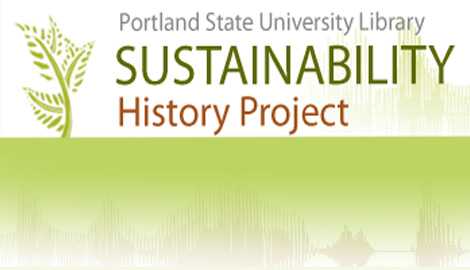By Laura Gleim, Institute for Sustainable Solutions
Wondering what New Seasons was like back in 2006 as it ramped up to take the Portland area by storm? Or how Hopworks Urban Brewery’s pubs can afford to have custom furniture made of old growth wood? Or why Portland Fashion Week staked its claim on eco-fashion? A new archive of candid audio interviews with local Portland entrepreneurs, innovators, and policy-makers has the answers.
With more than 140 interviews, and the intention to add more each year, the public online archive at Portland State University Library represents the hotbed that is Portland’s sustainable economy. The Sustainability History Project features candid interviews with experts in the building, farming, fashion, brewing, food, transportation, and—get this—human burial industries, among many others.
“It’s the only thing like it,” said Joshua Binus, a Portland State University Capstone instructor who launched the project in 2006 with his students.
“We wanted to get past the veneer of green marketing and see how people in the Northwest were actually incorporating sustainability strategies into their businesses and policies,” Binus said.
The archive offers a way for anyone to spend some quality time with people who have tried doing things a little differently—and have found success:
- Christian Ettinger, founder of Hopworks Urban Brewery, speaks about the intrinsic marketing power of sustainably made products and the long-term payoff of using quality building materials in restaurants and brewpubs. Find out what prompted him to “feel like a Hare Krishna at the airport trying to tell people this.”
- Alisa Kane spoke early in her tenure as city of Portland’s green building manager, touching on the opportunities for women in green building, the city’s moves toward composting, and her desire to address social equity as an aspect of sustainability not covered by LEED, saying “I hope we address social issues as a culture, not as a standard.”
- Chris Cone, production designer for Portland Fashion Week, describes how Portland embraced the concept of sustainability to produce a week of shows dedicated to eco-fashion that drew audiences from around the world.
- John Ashcraft, recycling supervisor at Free Geek, describes the global culture of electronics reuse and recycling that was incubated in Portland and talks about how the iPad age is going to change the face of e-waste. “Anyone who sees this much scrap electronics will think twice before they buy something new.”
There’s also a fairly extensive set of interviews from 2013 with people working to make our public schools healthier, happier places for Portland’s children. Like the founders of Schoolyard Farms—an urban farm at Candy Lane Elementary that runs a CSA and uses the proceeds to fund food education programs at the school. Or Kristine Garnero Obbink, a nutritionist with Portland Public Schools, who helped introduce salad bars in school cafeterias: “We knew if kids could help themselves to as much or as little fruits and vegetables as they wanted, then they tended to eat them,” she said.
More than 200 students at Portland State University have participated in the project over the past eight years. Binus says that for many students, the experience has been transformational.
“Students get to a point where they feel this doom and gloom about sustainability issues,” said Binus. “We used this project as a way to help them see past that. The interviews as a whole are pretty optimistic—they’re about solid business models that are alternatives to the status quo.”
Listen to interviews for yourself from the Sustainability History Project at the PSU Library Special Collections and University Archives website. It’s free and publically accessible.


